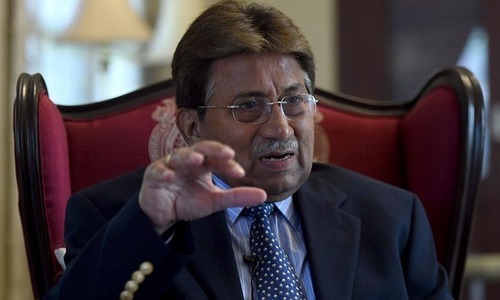LAHORE: Additional Attorney General (AAG) Ishtiaq A. Khan on Thursday told a Lahore High Court full bench that formation of the special trial court that convicted former president retired Gen Pervez Musharraf for high treason had not been approved by the federal cabinet.
He said the record had only one letter written by then prime minister Nawaz Sharif to the ministry of interior for the initiation of an inquiry against Musharraf on charge of high treason.
“There had been no approval from federal cabinet for filing of complaint and formation of special trial court,” the federal law officer explained to the bench during hearing of petitions by Musharraf challenging multiple actions against him, including conviction in high treason, establishment of the trial court and filing of the complaint by the government.
“Even the letter sent by the then prime minister had no approval from the cabinet,” he said, responding to another query by the bench headed by Justice Syed Mazahar Ali Akbar Naqvi.
Justice Muhammad Ameer Bhatti and Justice Chaudhry Masood Jahangir are other members at the bench.
‘Declaration of emergency does not fall within the definition of treason’
AAG Khan stated that the special court was established on Nov 18, 2013 while the record did not show any meeting of the cabinet on the subject. He said the complaint against Musharraf was filed on Dec 11, 2013.
Justice Naqvi wondered if there was any provision in criminal law allowing formation of the trial court before the filing of a complaint.
The law officer continued and said the inquiry was held by Federal Investigation Agency and was subsequently presented before the trial court. He pointed out that the agency in its report termed the acts of Musharraf unconstitutional. However, he said, the trial court did not discuss the report in charges framed on the former president.
A legal panel representing
Musharraf also argued that the declaration of state of emergency did not fall within the definition of treason. Panel’s head Khwaja Ahmad Tariq Rahim said the imposition of emergency had also not been declared treason in case of retired chief justice Abdul Hameed Dogar.
He argued that Article 6 of the Constitution, which dealt with offence of high treason, had been amended through 18th Amendment and implemented retrospectively against Musharraf.
Advocate Azhar Siddique, another counsel of Musharraf, stated that the president of the special trial court also implemented the law retrospectively while another member of the three-judge court dissented to this interpretation.
The bench observed that it could not question the basis of the trial court’s verdict, however, could see whether the proceedings initiated by it were in accordance with law.
To a court’s query, AAG Khan said the trial proceedings could not be concluded without recording statement of an accused under section 342 of Cr.P.C.
The bench adjourned further hearing till Friday (today) and also directed Barrister Ali Zafar to render his assistance in the case.
The special court of Islamabad had announced its verdict on Dec 17 and handed down death penalty to Musharraf with a two to one majority.
In the petition, Musharraf asked the LHC to set aside the special court’s verdict for being illegal, without jurisdiction, unconstitutional, in violation of Articles 10-A, 4, 5, 10 and 10-A of the Constitution. He sought suspension of the verdict till decision of the petition.
Published in Dawn, January 10th, 2020

















































Dear visitor, the comments section is undergoing an overhaul and will return soon.